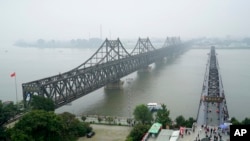A cascade of disappointing economic news may force Beijing to curtail some of its expansive foreign policy ambitions, but analysts who follow Korean Peninsula affairs see little prospect that Chinese assistance to Pyongyang will be reduced.
China's economy had been expected to pick up after the draconian pandemic lockdowns were lifted at the end of last year. Instead, it has seen tumbling exports, declining productivity, and public sector pay cuts.
Economic growth in the second quarter fell below 1%, against a projected annual growth of 5.6% in 2023.
Exports in July fell more than 14% compared with the same month last year, plunging at the sharpest rate since February 2020, according to China's customs data released on Tuesday, as reported by Reuters.
China's exports to the U.S. alone fell by 14.5% in July from a year ago. Mexico has replaced China as the top U.S. trading partner.
Unemployment in the second quarter reached 5.2% overall with youth unemployment soaring higher than 21% in June.
That could be bad news for North Korea, which is heavily dependent on China, its top trading partner and a steady provider of economic aid ranging from fuel to medicine and food.
That dependency has been greater since the 1990s because of the collapse of former Soviet Union, which had provided financial support to Pyongyang, and due to international sanctions that accelerated with the pace of North Korea's nuclear and missile tests since its first nuclear test in 2006.
China, however, in recent years, has been reluctant to approve United Nations sanctions that the U.S. tried to get the Security Council to pass in response to Pyongyang's more-frequent missile tests.
But experts told VOA's Korean Service that a reduction in aid is unlikely while Beijing faces mounting tension with the United States and its regional allies, including South Korea and Japan. They also note that Chinese aid to North Korea accounts for only a very small portion of China's estimated $3.4 trillion budget. The lack of transparency in both countries makes exact figures difficult to calculate, they said.
VOA contacted the North Korean Mission at the United Nations for comment on the aid received from China but did not receive a reply.
Politics plays big role
The experts said Beijing's economic aid is likely to continue for geopolitical reasons.
"Political, rather than economic factors tend to play a larger role in Chinese aid to North Korea," said Troy Stangarone, a senior director at Korea Economic Institute who specializes in South Korean trade and North Korea.
"With tensions with the United States growing, China is looking to increase ties with North Korea and Russia, providing an additional incentive for Beijing to continue providing support to Pyongyang during a slowing economy," Stangarone continued.
China has tightened its ties with North Korea as U.S.-South Korea relations grew stronger in recent months.
Thawing bilateral ties between Seoul and Tokyo since March enabled Washington to enhance trilateral security cooperation with its two allies to defend against North Korean threats and counter China's assertiveness in the region.
The three countries are expected to discuss ways to bolster defenses in the region when they hold a summit at Camp David next week.
When China's delegation visited Pyongyang from July 27 to 30, Beijing and Pyongyang vowed to revive their relations to "a new high stage through close strategic and tactical collaboration," according to official North Korea media as reported by KCNA Watch..
The trip included touring a military weapons exhibition and attending a parade that featured advanced weapons to celebrate the 70th anniversary of signing the armistice agreement that ended fighting in the Korean War in July 1953.
Borders reopen
Since Pyongyang has gradually opened its borders that were shut in 2020 to prevent the spread of COVID-19, trucks and freight trains have been spotted crossing the Sino-Korea Friendship Bridge connecting the Chinese city of Dandong and the North Korean city of Sinuiju.
Bradley Babson, a former World Bank adviser and an advisory council member of the Korea Economic Institute, said China doesn't want to have North Korea "completely collapse economically." Beijing is seen as wanting to avoid economic collapse in North Korea to prevent a humanitarian disaster and refugees crossing into China.
Babson continued, "China will do what it feels is politically in its interest with North Korea, and it's not going to be driven hugely by Chinese wider economic issues." He added that Beijing is "benefiting from the North Korean tilt towards China."
Chinese Embassy spokesperson Liu Pengyu in Washington told VOA's Korean Service on Monday that Beijing's ties with Pyongyang are good for the stability of the Korean Peninsula.
"China and the DPRK are friendly neighbors connected by mountains and rivers," he said. "Consolidating and growing bilateral relations serves the common interests of both sides and is conducive to peace and stability of the Korean Peninsula and the region."
According to Chinese economic performance highlights in the first half of 2023 that Liu provided with his comments, China saw "an upward trend of growth" with its GDP growing more than 5%.
Its service sector sales rose by 21.5%, and trade with Belt and Road partner countries increased by 9.8%. At the same time, urban job creation reached 6.78 million, according to the embassy's figures Liu provided, adding, "The Chinese economy had a sound recovery in the first six months of this year."





